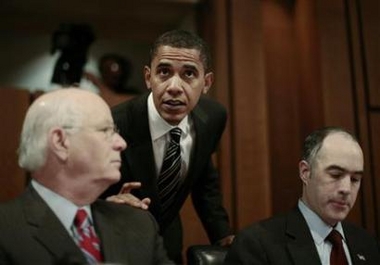Senate committee repudiates Bush on Iraq
(AP)Updated: 2007-01-25 08:39
WASHINGTON - In a calculated snub of President Bush, the Democratic-controlled Senate Foreign Relations Committee dismissed plans for a troop buildup in Iraq on Wednesday as "not in the national interest" of the United States.
"There is no strategy. This is a pingpong game with American lives," said Republican Sen. Chuck Hagel of Nebraska.
"This Congress was never meant to be a rubber stamp," added Sen. Barbara Boxer, D-Calif., "Read the Constitution. The Congress has the power to declare war. And on multiple occasions, we used our power to end conflicts."
Hagel was the only one of 10 committee Republicans to support the nonbinding measure. Several of the panel's 11 Democrats said they favored stronger legislation to register their opposition to the war.
In the wake of midterm election losses, Bush announced two weeks that he would order an additional 21,500 troops into the war zone. In Tuesday night's State of the Union address, he implored skeptical lawmakers to give the strategy a chance.
Bush got his answer in less than 24 hours, the timing dictated by Democrats, and Sen. Joseph Biden. D-Del., the panel's chairman, said tougher measures were likely to follow.
"Unless the president demonstrates very quickly that he is unlikely to continue down the road he's on, this will be only the first step. ... I will be introducing ... constitutionally legitimate, binding pieces of legislation. We will bring them up," he said.
Taken together, the committee's vote and Cheney's response suggested the Democrats and the White House were on a collision course - lawmakers drafting ever-stronger measures to change policy in Iraq, and the president exercising his prerogatives as commander in chief - and his veto pen.
"We are moving forward," Cheney said in an interview with CNN in which he was asked about the troop buildup. "The Congress has control over the purse strings. They have the right, obviously, if they want, to cut off funding. But in terms of this effort, the president has made his decision."
The vice president added: "We've consulted extensively with them. We'll continue to consult with the Congress. But the fact of the matter is, we need to get the job done."
Inside the Senate committee, all Republicans but Hagel opposed the measure, denying Democrats the strong bipartisan vote they had sought.
Biden, who has announced he intends to run for president in 2008, said the legislation is "not an attempt to embarrass the president. ... It's an attempt to save the president from making a significant mistake with regard to our policy in Iraq."
Democrats intend to bring the measure to the Senate floor for a vote next
week, and Biden said he is willing, in the interim, to make changes in the hopes
of gaining additional Republican support.
| 1 | 2 |  |
|
||
|
||
|
|


